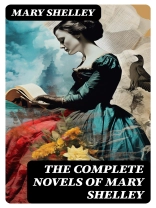The Complete Novels of Mary Shelley compiles the seminal works of one of literature’s pioneering figures, presenting her profound examination of humanity, morality, and the consequences of unbridled ambition. The collection features the iconic 'Frankenstein, ’ a gothic exploration of creation and its discontents, alongside lesser-known gems such as 'The Last Man’ and 'Valperga.’ Shelley’s literary style blends the romantic with the philosophical, marked by lyrical prose and rich introspection, situating her within the Romantic Era’s fascination with the sublime and the exploration of nature versus nurture. The books reflect a critical engagement with contemporary debates on science and ethics, foreshadowing modern concerns about technology and human responsibility. Mary Shelley, born in 1797 to the influential intellectuals William Godwin and Mary Wollstonecraft, was no stranger to the complexities of existence and the burdens of creation. Her life experiences, including the loss of loved ones and societal critiques of rigid gender roles, deeply influenced her narratives. This collection is a testament to her genius, encapsulating her responses to the turbulent world around her, characterized by upheaval and transformation, both personally and politically. This anthology is essential for readers seeking to grasp the foundations of science fiction and gothic literature. Shelley’s profound insights into the human condition resonate powerfully in contemporary society, making this collection not only a literary treasure but a timeless reflection on the enduring struggle between creation, responsibility, and the ethical implications that arise from our choices.
O autorze
Mary Wollstonecraft Shelley, born on August 30, 1797, was a pivotal figure in the realm of English literature, remembered predominantly for her iconic gothic novel 'Frankenstein; or, The Modern Prometheus’ (1818). Her parentage was notable: her mother, Mary Wollstonecraft, was a trailblazing feminist philosopher, and her father, William Godwin, was a political philosopher and novelist. Despite the shadow of her illustrious parentage, Mary Shelley emerged as a literary force in her own right. Her foray into the writing world was colored by her early exposure to political and intellectual discussions, and her education was bolstered by her father’s extensive library and literary connections. In 1816, in the company of her future husband, the Romantic poet Percy Bysshe Shelley, and Lord Byron, she conceived 'Frankenstein’ during a summer sojourn by Lake Geneva, which later established her as a pioneer of science fiction. Beyond 'Frankenstein’, Mary Shelley’s oeuvre includes novels such as 'The Last Man’ (1826), which ventured into dystopian fiction, and 'Valperga’ (1823), demonstrating her versatility and depth in historical and speculative genres. Despite facing the era’s gender biases, she sustained her literary career after Percy’s untimely death while single-handedly raising their son. Shelley’s works are a testament to her intellectual vigor and her poignant exploration of human condition, societal norms, and the reaches of imagination. Her narratives, while exploring Romantic ideals and Enlightenment rationality, also delve into the tumult of individual passions and the consequences of hubris, themes that continue to resonate today. 'The Complete Novels of Mary Shelley’ bring together her significant contributions, cementing her legacy as a vanguard of nineteenth-century English literature.












